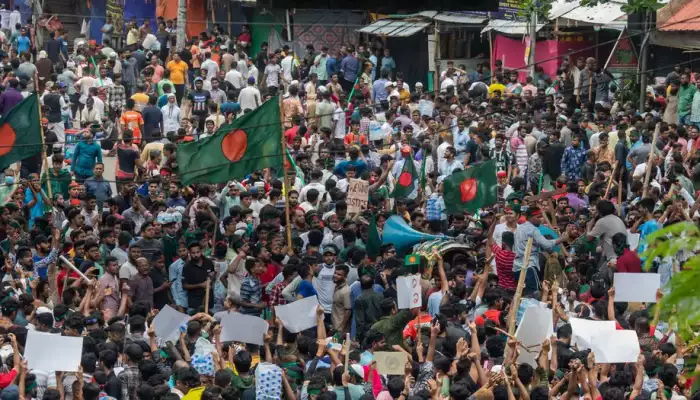
Bangladesh's prime minister, Sheikh Hasina, has resigned and fled to India following weeks of deadly protests in the country.
The country's military chief, General Waker-Us-Zaman, announced the formation of an interim government in a televised speech. He promised to ensure justice for all victims.
Earlier on Monday thousands of demonstrators stormed the Hasina's official residence in the capital, Dhaka.
Bangladesh's Channel 24 broadcast images of crowds running into the premier's official residence in the capital, waving to the camera as they celebrated.
Protesting students had called for a march to the capital on Monday in defiance of a nationwide curfew.
The South Asian country has seen rallies that began last month as resistance to civil service job quotas metamorphose into some of the worst unrest seen during the 15-year rule of the 76-year-old Hasina, who returned to power for a fourth consecutive term in January in a vote boycotted by her main opponents.
The country's leading Bengali-language daily newspaper, Prothom Alo, has reported that almost 100 people, including at least 14 police officers, died in clashes in Dhaka on Sunday, with some media estimates putting the death toll much higher.
Why are people protesting?
The protests have their roots in student-led rallies calling for the end to a quota system, under which 30% of government jobs were reserved for the families of veterans who fought in Bangladesh's war of independence against Pakistan in 1971.
Although the government has accepted a Supreme Court ruling last month that the veterans' quota must be cut to 5%, with 93% of jobs to be allocated on merit, protests have continued, partly against what many see as a disproportionate use of force by authorities.
Several hundred are people believed to have been killed in clashes since the unrest began.
Protesters had called for an end to Hasina's rule, with her government accused by rights groups of misusing state institutions to keep hold of power and of cracking down on dissent.
Hasina's ruling Awami League party, for its part, has said the transformation of the rallies into broader anti-government protests shows that the protests have been appropriated by the main opposition Bangladesh Nationalist Party and the now-banned Jamaat-e-Islami party.
At least 11,000 people have been arrested in recent weeks.
Government imposes anti-protest measures
The military has imposed a curfew that went into effect on Sunday night covering Dhaka and several other regions.
The government has also declared a holiday from Monday to Wednesday. Mobile internet services have been cut off, and Facebook and messaging apps, including WhatsApp, cannot be accessed.
In addition, the country's more than 3,500 garment factories — a major and economically vital industry in Bangladesh — have been shut.